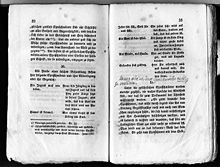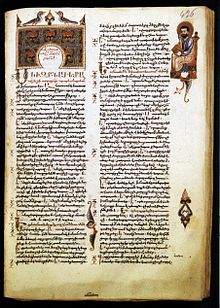- Marginalia
-
For the collection of short stories, essays, biography, and poetry, see Marginalia (collection).
 The Glosas Emilianenses are glosses added to this Latin codex that are considered the oldest surviving phrases written in the Castilian language.
The Glosas Emilianenses are glosses added to this Latin codex that are considered the oldest surviving phrases written in the Castilian language.
Marginalia (or apostil) are scribbles, comments, and illuminations in the margins of a book.
Contents
Biblical manuscripts
Biblical manuscripts have liturgical notes at the margin, for liturgical use. Numbers of texts' divisions are given at the margin (κεφαλαια, Ammonian Sectins, Eusebian Canons). There are some scholia, corrections, and other notes usually made later by hand in the margin.
History
The scholia on classical manuscripts are the earliest known form of marginalia. Fermat's last theorem is the most famous mathmatical marginal note.[1]
The first recorded use of the word marginalia is in 1819 in Blackwood's Magazine.[2] From 1845 to 1849 Edgar Allan Poe titled some of his reflections and fragmentary material "Marginalia."[3] Five volumes of Samuel T. Coleridge's marginalia have been published.
Some famous marginalia were serious works, or drafts thereof, written in margins due to scarcity of paper. Voltaire composed in book margins while in prison, and Sir Walter Raleigh wrote a personal statement in margins just before his execution.
Beginning in the 1990s, attempts have been made to design and market e-book devices permitting a limited form of marginalia. In 2004, the Sony Librie EBR-1000EP was introduced with a tiny but full QWERTY keyboard below the display, to permit the creation of marginalia and bookmarks.[citation needed]
Value
Marginalia can add or detract from the value of an association copy of a book, depending on the author of the marginalia and on the book.
Catherine C. Marshall, doing research on the future of the user interface, has studied the phenomenon of user annotation of texts. She discovered that in several university departments, knowledgeable students would scour the piles of textbooks at used book dealers for consistently annotated copies. The students had a good appreciation for their predecessors' distillation of knowledge.[4][5][6]
Writers Known for their marginalia
- Samuel T. Coleridge[7]
- David Markson[8]
- Herman Melville[9]
- Sylvia Plath[10]
- Mark Twain[11]
- David Foster Wallace[12]
- Pierre de Fermat
Notes
- ^ Singh, Simon (1997). Fermat's Enigma: The Epic Quest to Solve the World's Greatest Mathematical Problem. Fourth Estate Ltd. ISBN 0385493622.
- ^ "marginalia". Oxford English Dictionary. Oxford University Press. 2nd ed. 1989.
- ^ "Edgar Allan Poe Society of Baltimore - Works - Misc - Marginalia". http://www.eapoe.org/works/info/pmmar.htm. Retrieved 2009-11-22.
- ^ "Seeing the picture - Crowdsourcing annotations for books (and eBooks)". Blog. University of Iowa Libraries. http://blog.lib.uiowa.edu/hardinmd/2009/06/08/crowdsourcing-annotations-for-books-and-ebooks/. Retrieved 2011-07-03.
- ^ Cathy Marshall. "From Personal to Shared Annotations" (PDF). Texas A&M University. http://www.csdl.tamu.edu/~marshall/CCM-AJB.pdf. Retrieved 2011-07-03.
- ^ "Social Annotations in Digital Library Collections". D-Lib Magazine. 1998-03-24. http://www.dlib.org/dlib/november08/gazan/11gazan.html. Retrieved 2011-07-03.
- ^ "A Book I Value: Selected Marginalia — Samuel Taylor Coleridge". Princeton University. 2011-06-29. http://press.princeton.edu/titles/7541.html. Retrieved 2011-07-03.
- ^ "Reading Markson Reading". tumblr.com. 2010-07-26. http://readingmarksonreading.tumblr.com/. Retrieved 2011-07-03.
- ^ "Melville Marginalia Online". MelvillesMarginalia.org. http://melvillesmarginalia.org/. Retrieved 2011-07-03.
- ^ Park Bucker (2003-12-11). "Princess Daisy: A Description of Sylvia Plath’s Copy of The Great Gatsby". University of South Carolina. http://www.sc.edu/fitzgerald/essays/plath.html. Retrieved 2011-07-03.
- ^ The Mark Twain House and Museum (2010-01-08). "Mark Twain's Marginalia". blogspot.com. http://marktwainhouse.blogspot.com/2010/01/mark-twains-marginalia.html. Retrieved 2011-07-03.
- ^ "Harry Ransom Center". University of Texas. http://www.hrc.utexas.edu/press/releases/2010/dfw/books/. Retrieved 2011-07-03.
References
- Jackson, H. J. Marginalia: Readers writing in Books, New Haven: Yale University Press, 2001. ISBN 0-300-08816-7 N.B: one of the first books on this subject
- Coleridge, S. T. Marginalia, Ed. George Walley and H. J. Jackson. The Collected works of Samuel Taylor Coleridge 12. Bolligen Series 75. 5 vols. Princeton University Press, 1980-.
- Alston, R. C. Books with Manuscript: A short title catalogue of Books with Manuscript Notes in the British Library. London: British Library, 1994.
External links
- Marginalia and other crimes from Cambridge University Library
- Teachers’ Uses of Students’ Digital Annotations: Implications for the Formative Assessment of Reading Comprehension, Barry Brahier, 2006 (University of Minnesota)
- Marginalia: Six Personal Libraries (Thomas Carlyle, Ralph Waldo Emerson, William James, John Keats, Herman Melville, Hester Thrale from Harvard University Library
Categories:
Wikimedia Foundation. 2010.


